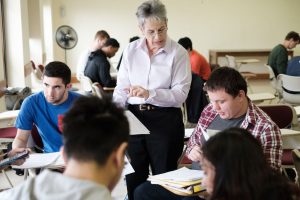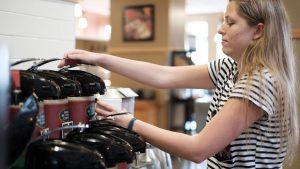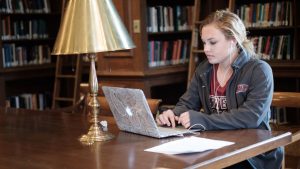
Students from the 11 a.m. Financial Theory and Analysis course huddle ahead of class to handle a challenging assignment.
10:45 a.m.
In a hallway at the Simon Center for Economics and Business, Jimmy Cochran ’18, Maddie Bowles ’18, Sydney Crowe ’19, Matt Dicker ’18, Syeda Ahmed ’20, and Sarah Vanderbilt ’18 cluster at a table over notebooks and papers covered in equations.
In 15 minutes, Rosie Bukics, Jones Professor of Economics, will appear and their 11 a.m. Financial Theory and Analysis class will begin. Cochran calls it a “weed-out class,” which means if you struggle you might muster a C. And if you fail, Cochran says, maybe that career in economics isn’t for you.
The group is frantically going over the homework. Today, they’re calculating earnings per share for a variety of companies.
Among the homework ciphers is what Bukics calls her “megaproblem.”
At 11 a.m., Bukics, a wiry, silver-haired woman, strides into the classroom cradling an iced tea from Panera Bread.
Students break into four groups of five. Bukics assigns each group a team leader and a wash of murmurs fills the classroom. Bukics wanders from group to group, offering encouragement or gently poking fun.

Rosie Bukics, Jones Professor of Economics, huddles with a group of students working on an earnings per share problem.
“What did you get for the answer?” she asks one student.
“.4975.”
Bukics turns to the class.
“Accept or reject. Anyone?”
Twenty pairs of eyes stare back at her, blankly.
“Aaaaaa,” Bukics rumbles, imitating a buzzer in a game show. “Sorry.”
She sips from her tea.
“EPS is very unforgiving,” she says. “You either get it, or you don’t.”
She reminds the group of her megaproblem—an earnings per share cryptogram stuffed with variables. Students who can solve it should pass their final exam in a few weeks.
“The megaproblem is the most critical problem of everything you just did,” she says. “It’s got everything in it but the kitchen sink. So the next time you see it, it’ll have the kitchen sink in it. One more wrinkle.”
One group finishes early. It’s Cochran’s team.
“Got one group done over here,” she says in a sing-song voice. “No pressure.” Then to the group: “Well, you guys rocked it!” She laughs. “I like it when you guys make mistakes. Gives us something to talk about.”
After class, Cochran smiles.
“It’s basically accounting on steroids,” he says. “In terms of the econ majors, this is probably like the hardest class.”
________________________________________




